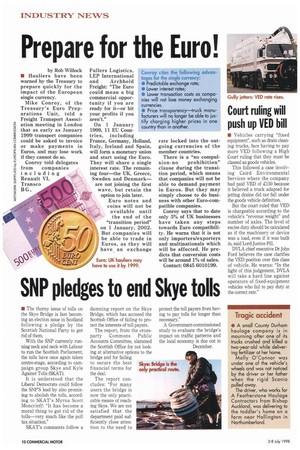Prepare for the Euro!
Page 12

If you've noticed an error in this article please click here to report it so we can fix it.
by Rob Willock • Hauliers have been warned by the Treasury to prepare quickly for the impact of the European single currency.
Mike Conroy, of the Treasury's Euro Preparations Unit, told a Freight Transport Association meeting in London that as early as January 1999 transport companies could be asked to invoice or make payments in Euros, and may lose work if they cannot do so.
Conroy told delegates from companies including Renault VI, Transco B G , Fullers Logistics, LEP International and Archbold Freight: "The Euro could mean a big commercial opportunity if you are ready for it—or hit your profits if you aren't."
On 1 January 1999, 11 EU Countries, including France, Germany, Holland, Italy, Ireland and Spain, will form a monetary union and start using the Euro. They will share a single interest rate. The remaining four—the UK, Greece, Sweden and Denmark— are not joining the first wave, but retain the option to join later.
Euro notes and coins will not be available until tP° the end of the "transition period" on 1 January, 2002. \ But companies will I be able to trade in Euros, as they will have an exchange rate locked into the outgoing currencies of the member countries.
There is a "no compulsion-no prohibition" clause during the transition period, which means that companies will not be able to demand payment in Euros. But they may simply choose to do business with other Euro-compatible companies.
Conroy says that to date only 5% of UK businesses have taken any steps towards Euro compatibility. He warns that it is not only importers/exporters and multinationals which will be affected. He predicts that conversion costs will be around I% of sales.
Contact: 0845 6010199. Conroy cites the following advctages for the single currency:
• Predictable exchange rate; • Lower interest rates; • Lower transaction costs as companies will not lose money exchanging currencies.
Price transparency—truck manufacturers will no longer be able to justify charging higher prices in one country than in another.












































































































